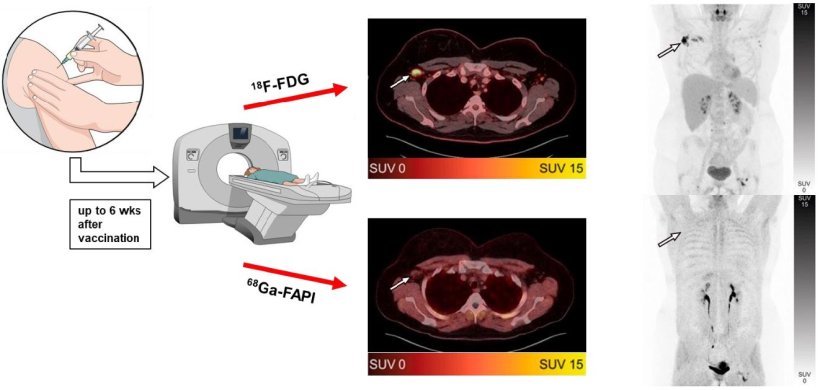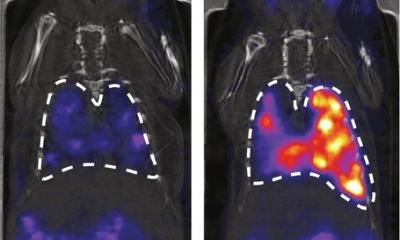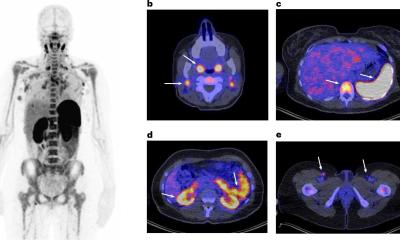
Image source: Demmert et al., Journal of Nuclear Medicine 2022 (CC BY 4.0)
News • Nuclear imaging
New PET radiotracer to reduce false-positive cancer findings after Covid-19 vaccination
A novel imaging agent, 68Ga-FAPI, can reduce the number of false-positive PET/CT findings among cancer patients recently vaccinated for Covid-19.
New research published in The Journal of Nuclear Medicine shows that 68Ga-FAPI imaging offers superior lesion detection without vaccine-related tracer uptake in locoregional lymph nodes that is common with 18F-FDG imaging. This can help to prevent costly follow-up and false management decisions for cancer patients.
Recommended article

News • Immune response or breast cancer?
Swollen lymph nodes after Covid-19 vaccination: what women should know
For many women, swollen lymph nodes are a red flag pointing to breast cancer – but may also be a normal immune reaction to a Covid-19 vaccination. In this Q&A, breast imaging experts address the most important facts on the topic.
One side effect of the Covid-19 vaccine is that 18F-FDG (the most commonly used PET imaging agent) is taken up by immune cells responding to the mRNA inflammatory stimulus caused by the vaccine. This is known as a reactive uptake and does not always indicate that a tumor is present. “This observation is concerning as vulnerable groups, such as oncologic patients, undergo both regular Covid-19 booster shots and medical imaging,” said Tristan T. Demmert, researcher in the Department of Nuclear Medicine at Essen University Hospital in Essen, Germany. “False positive findings on 18F-FDG PET due to reactive uptake may trigger false management decisions.”
Considering that further booster vaccinations are expected, 68Ga-FAPI could show its potential in avoiding vaccine-related misinterpretations on PET/CT while providing equivalent tumor detection
Tristan T. Demmert
To find a way to avoid these false positives, researchers compared two radiotracers, 68Ga-FAPI and 18F-FDG. Using a large prospective imaging registry, researchers investigated 11 oncologic patients who had received a Covid-19 vaccination within six weeks, had 68Ga-FAPI and 18F-FDG imaging on the same day, and had documentation of tracer uptake in locoregional lymph nodes. Visual readings of the images were performed by two nuclear medicine physicians. Significant lymph node uptake adjacent to the injection site was noted in 11/11 patients with 18F-FDG PET/CT versus 0/11 with 68Ga-FAPI PET/CT. In addition, 18F-FDG detected 73% of tumor lesions, while 68Ga-FAPI detected 94% of all tumor lesions.
“In patients with suspected tumors in the axillary region, a costly follow-up was often recommended to avoid incorrect patient treatment. According to our results, this could have been prevented by using 68Ga-FAPI, which would have allowed higher tumor detection at the same time,” noted Demmert. “Considering that further booster vaccinations are expected, 68Ga-FAPI could show its potential in avoiding vaccine-related misinterpretations on PET/CT while providing equivalent tumor detection.”
Source: Society of Nuclear Medicine and Molecular Imaging
13.01.2023





